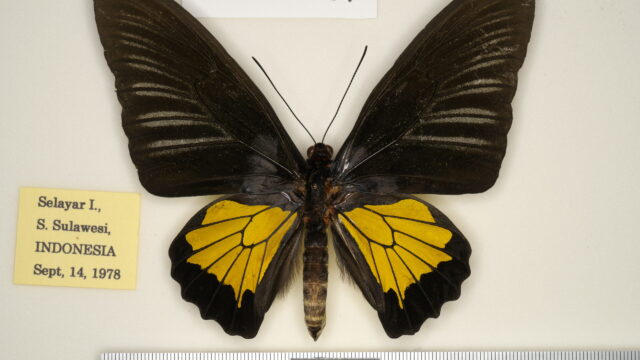- Ssp. thestius (Staudinger, 1896)32) [♂, ♀] (♂: 2 forms, ♀: 2 forms)
= leda, (Staudinger, 1891)31) (nec Wallace, 186534)) [♂, ♀] (Salajar (=Selayar) Is.)
= celebensis, Rothschild, 189526) (nec Wallace, 186534)) [♂, ♀] (Macassar, Seleyar Is.)
= minahassae Franz, 19528) [♂] (Celebes (=Sulawesi)(Minahassa))
(Distribution) [Map 138]
INDONESA [S. Sulawesi] Selayar (=Kabia) Is., Tanahjampea Is., [S.-E. Sulawesi] Muna Is., Buton Is., Tukangbesi Islands (Wangiwangi Is., Tomea Is., Binongko Is.), Batuata Is.
(Episodes of discovery and original description)
The first description of this species was 1♀, reported by Boisduval (1832) as amphimedon (= oblongomaculatus). Later Staudinger (1891) described it as Leda, a local form of a small locality of T. helena, based on 5♂♂4♀♀ collected by Kühn on Salajar Island. However, in 1896, Staudinger wrote in D. E. Z. Iris, vol. 8, 1895 edition (actually published in January 1896) that he had overlooked that Wallace (1865) had already used the name Leda for a subspecies of the Cerebesian birdwing before him, and that Felder (1864) had already named it hephaestus a year before Wallace, and he proposed that Leda be renamed Thestius (the name of Leda’s father). Thestius was the name of the king of Pleuron of Aetolia in Greece, the father of Helena’s mother, Leda (queen of Tyndareos, king of Sparta) (Greek mythology).
(Characteristics)
Both sexes have dark and light forms. This is very similar to the alternate species helena hephaestus from Sulawesi Is. with more pointed apices of FW and HW then other ssp. There are also many individual variations of semi-translucent golden spots on HW of ♂.
(Spotted pattern)
♂: Classified into two forms according to the presence or absence of vein-stripes on FW.
- Dark form (no name): FW uniformly glossy black without vein-stripe.
- Light form (♂-f. thestius (Staudinger, 1896)32) (=bernhardus Fruhstorfer, 189810))): FW with distinct vein-stripes on both sides (most individuals are of this form).
Individual variation in the semi-translucent golden spot on HW is remarkable. The variation ranges from those with large golden spots with veins narrowly fringed by black scales to those with small spots with veins broadly fringed. In general, the black marginal border is broad in spaces 2 – 5.
♀: In HW, a yellow cell-spot occupies about half of the cell, but yellow discal spots, in spaces 1b – 6 are less than half of every discal space and are small overall. Dark discal spots and a dark marginal border are closely fused to each other.
- Dark form (♀-f. aetolis Ohya, 198323)): FW without vein-stripes. Rare.
- Light form (♀-f. thestius (Staudinger, 1896)32) (= leda, (Staudinger, 1891)31)) (nec Wallace, 186534))): FW with distinct grayish-white vein-stripes on both sides.












